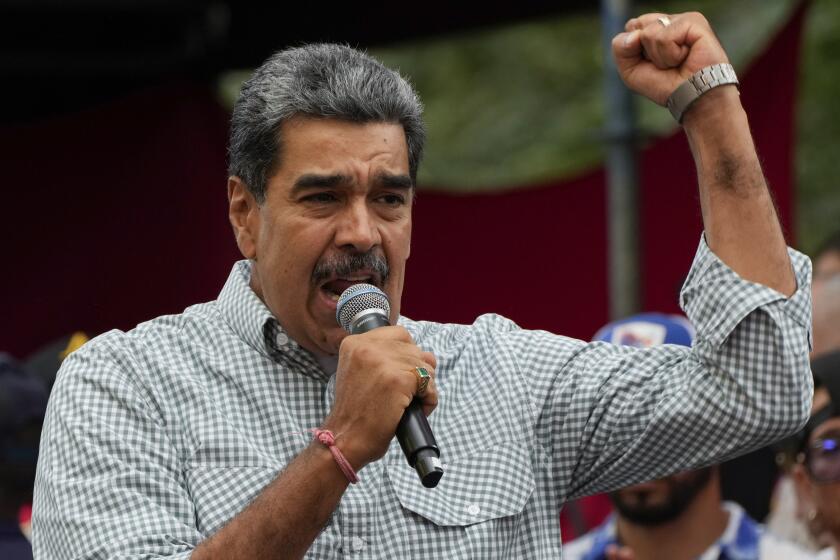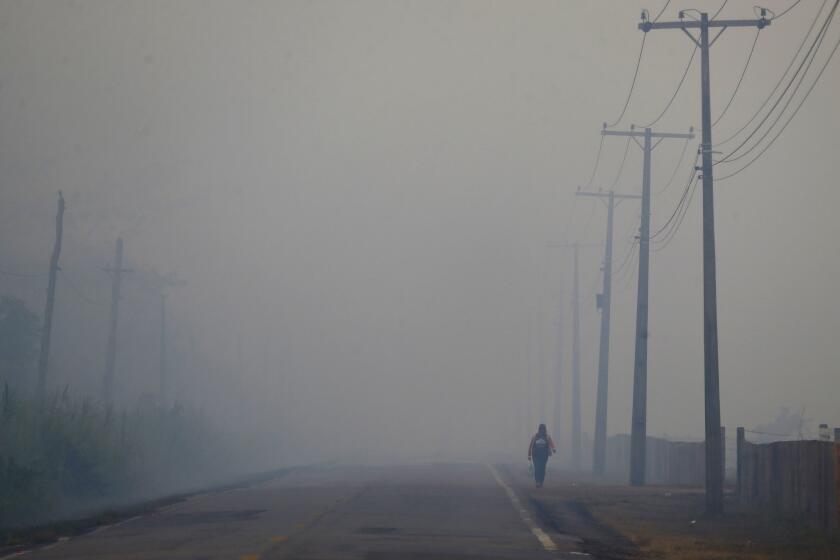Drug lord’s prison escape is yet another blow to Mexican president
As a massive manhunt unfolded across Mexico on Monday aimed at recapturing one of the world’s most famous — and most slippery — fugitives, there was a growing conviction that the now twice-escaped head of the Sinaloa drug cartel could not have carried out his ambitious breakout without cooperation at the highest levels of Mexican officialdom.
For President Enrique Peña Nieto, the escape from a maximum-security prison by Joaquin “El Chapo” Guzman could not have come at a worse time.
Already struggling with a credibility crisis brought on by real estate scandals and the kidnapping and likely killing of 43 college students by police, Peña Nieto must now face the loss of what had been one of his major victories: the capture of Mexico’s top trafficker of heroin, marijuana and cocaine.
“This is an affront to the Mexican government,” Peña Nieto said in Paris, where he was on a state visit with most of his Cabinet. He dispatched Interior Minister Miguel Angel Osorio Chong, who returned to Mexico City on Monday afternoon and immediately toured the site of Guzman’s escape.
The escapee, the minister told reporters, “managed to elude all the internal security systems” and evaded detection despite wearing a tracking bracelet, in part, it appears, by breaking lightbulbs in his escape tunnel as he passed through so anyone following him would be in the dark.
Osorio Chong said he was convinced Guzman had help from prison employees, something he said would constitute “an act of corruption, disloyalty and betrayal.”
Federal prosecutors have interrogated 50 prison employees, including the warden, as well as two lawyers representing Guzman. The interior minister said all of the government’s resources, including naval special forces and intelligence agents, have been deployed in the manhunt. Federal authorities, who have offered a nearly $4-million reward for Guzman’s capture, are checking cars, operating roadblocks, inspecting air and land cargo, and communicating with counterparts in the U.S., Guatemala and Belize.
“There will be no rest for this criminal,” Osorio Chong said. “He is an enemy of our society.... There will be no truce in the search for him.”
But there was widespread public skepticism about the likelihood of corralling the notorious drug lord any time soon.
Many noted that Guzman’s exit route, a nearly mile-long tunnel leading out of his private shower, was sophisticated, would have taken months to build and hardly could have gone undetected.
“These tunnels in a prison absurdly called ‘maximum security’ are a metaphor for a state gnawed away by corruption,” commentator Jesus Silva-Herzog Marquez said in Monday’s Reforma newspaper. This kind of crime “within a jail is nothing short of a betrayal of public power.”
Peña Nieto had promised a new approach to security issues after the deadly drug-war fight that characterized his predecessor’s administration and claimed tens of thousands of lives. That promise, along with important reforms that included opening up the energy industry and improving education, foretold a bright future for Mexico.
But it all came crashing down. The president and his Institutional Revolutionary Party, or PRI, returning to the highest office in the land after a 12-year hiatus, were quickly embroiled in controversy while many of the reforms stalled and Mexico’s homicide and kidnapping rates continued to climb.
The kidnapping last fall of 43 college students by a drug gang working with police and local politicians came to haunt the government, which was seen as having bungled the investigation. It was also revealed that Peña Nieto, his wife and his closest aide, the finance minister, bought real estate from government contractors under favorable terms, an apparent conflict of interest.
“Corruption is the government’s Achilles’ heel,” pollster Jorge Buendia said. The Guzman escape “puts into question the efficiency of the government and the president and underlines the level of corruption in security issues.”
Guzman, in his 50s, fled the Altiplano prison sometime Saturday night, making his way through a tunnel that started below his shower and continued to an empty building under construction in a nearby field. Authorities said he was under constant camera surveillance, except in the shower.
He was one of about half a dozen top drug cartel leaders whom the Peña Nieto government has captured or killed. The government prided itself on what it called improved intelligence to pull off such important arrests, often with little bloodshed.
Guzman’s breakout Saturday was the second time he had escaped from a maximum-security prison. The first time was in 2001, purportedly by hiding in a laundry cart, after being captured in Guatemala in 1993. Before his capture last year, Guzman was Mexico’s most sought-after fugitive and one of the most infamous criminals in the world.
As head of the all-powerful Sinaloa cartel, Guzman, with his associates, came to control the lion’s share of illegal drugs being transported to the U.S. Forbes Magazine once estimated his wealth at $1 billion, though it’s impossible to really know.
The government’s critics immediately jumped on what by any account is a major security failure that reflects the insidious depth of corruption and lawlessness in Mexico.
“Chapo’s escapes show the degree of infiltration and corruption of the state,” congressman Fernando Belaunzaran of the leftist Democratic Revolution Party said. “Does anyone really think we are winning this war?”
“How many tunnels are being built in other prisons in the country?” asked Sen. Mariana Gomez del Campo of the conservative National Action Party. “Chapo Guzman’s tunnel, with all that technology included, and no one saw anything?”
And some ordinary Mexicans, exhausted by governments that routinely lie to them, weren’t buying any of the official explanations.
“I think this whole tunnel thing is another lie,” said Marisela Serrano, a nurse. “I’m sure El Chapo left through the front door, said goodbye to the warden and left off his suitcases full of cash. The country is full of corrupt politicians who protect criminals and become their accomplices.”
Cecilia Sanchez of The Times’ Mexico City bureau contributed to this report.
Twitter: TracyKWilkinson
More to Read
Sign up for Essential California
The most important California stories and recommendations in your inbox every morning.
You may occasionally receive promotional content from the Los Angeles Times.











